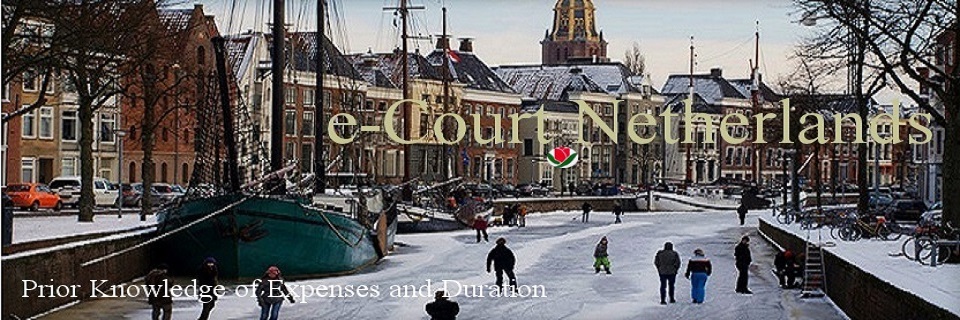Directorate of e-Court
( Note: for privacy reasons below information may be fictious )


B.G
After finishing her Bachelor study in Dutch law, B.G graduated for the Master International and European law at the University of Utrecht. B.G started her career as an attorney in 2010 at a niche law firm in Amsterdam. Here she gained extensive experience in employment law by advising and litigating in employment disputes. Her practice has been targeted particularly towards reorganizations, dismissals and unlawful competition disputes. Also, she has been engaged in cases concerning contract law and commercial litigation.
H.A
H.A received graduate and undergraduate degrees in The Netherlands and Canada (McGill). Worked in several countries such as the UK, the Netherlands and Canada. His field of specialization covers finance, administration and the media. H.A invites you to join him at LinkedIn
Arbitration in the Netherlands
Posted by Kirstin Nijburg and Bommel van der Bend

In the Netherlands, arbitration has traditionally been the most important form of dispute resolution along with court litigation, particularly for the resolution of construction or trade disputes. Such disputes are usually brought before the Netherlands Arbitration Institute (NAI) or the Arbitration Board for the Building Industry. The Netherlands is also renowned for arbitration of international trade disputes. There are many reasons why the Netherlands is an attractive seat for international arbitrations: as the host state of many international courts and tribunals – including the International Court of Justice, the Permanent Court of Arbitration and the International Criminal Court, as well as many specialised arbitration institutions – the Netherlands offers a favourable legal and logistical environment for accommodating, administering and conducting international arbitral proceedings. A much-welcomed added benefit of seating arbitral proceedings in the Netherlands is that it has cost advantages over more expensive venues such as Paris and London.
Another important factor is that the Dutch legislature and the judiciary have a favourable attitude towards arbitration. Dutch arbitration law affords the parties considerable freedom to determine the rules of procedure, and the state courts take a liberal approach to arbitration. The state courts do act as a safety net if issues arise that parties or arbitrators are unable to resolve, yet without interfering excessively in the arbitral process. They will decline jurisdiction if a party invokes an arbitration agreement before putting forward other defences, and if the arbitration agreement is valid and applicable to the subject matter in dispute.
As announced in the previous edition of this publication, the Dutch legal framework for arbitration is currently being reviewed in order to reflect and implement the latest features of international arbitration. A draft legislative proposal for the revision of the Dutch Arbitration Act was published in March 2012. Stakeholders were invited to comment on this draft legislative proposal. Following a few more modifications, on 16 April 2013, the minister of justice presented the draft amendment of the Dutch Arbitration Act to parliament. The proposed amendments are expected to further enhance the efficiency and flexibility of the arbitral process by avoiding delays through state court proceedings, reducing the administrative burden and maximising party autonomy.
After summarising the main characteristics of the current legal framework for arbitration in the Netherlands, this contribution will highlight some of the most significant proposed amendments. Subsequently, other recent arbitration developments in the Netherlands will be discussed
Legal framework for arbitration in the Netherlands
Each arbitration taking place in the Netherlands, regardless of the nationality of the parties or the subject matter of the arbitration, is subject to book 4 of the Dutch Code of Civil Procedure (DCCP), also referred to as the Dutch Arbitration Act.3The Act became effective in 1986 and is inspired in large part by the UNCITRAL Model Law. Most provisions are of a regulatory, not mandatory nature. The Dutch Arbitration Act contains fairly standard provisions on: the arbitration agreement; the appointment of arbitrators; the disclosure and challenge of arbitrators; procedure; witness and expert hearings; joinder and consolidation; competence-competence; the content of the award; correction and addition of the award; and recognition and enforcement. The most relevant features are addressed below.
No restrictive requirements for the arbitration agreement An arbitration agreement is considered and decided upon as a separate agreement. The arbitral tribunal has the power to decide on the validity of the contract of which the arbitration agreement forms part or to which the arbitration agreement is related Appeal of an award Appeal from the arbitral award to a second arbitral tribunal is possible only if the parties have agreed thereto. Parties, and the rules of recognised arbitration institutes, do not usually provide for the remedy of an arbitral appeal. Enforcement If no treaty concerning recognition and enforcement is applicable, or if an applicable treaty allows a party to rely upon the law of the country in which recognition or enforcement is sought, an arbitral award made in a foreign state may be recognised in the Netherlands and its enforcement may be sought in the Netherlands on the basis of the Dutch Arbitration Act. Leave for enforcement may be denied if:
All subject matters may be referred to arbitration, unless this would lead to legal consequences of which the parties cannot freely dispose. Strictly speaking, the Dutch Arbitration Act does not impose special requirements on arbitration agreements beyond the rules applicable to the formation of contracts in general. However, if the arbitration agreement is contested, its existence must be proven by an instrument in writing (or by electronic data fulfilling certain requirements). For this purpose, an instrument in writing which provides for arbitration or which refers to standard conditions providing for arbitration is sufficient, provided that this instrument is expressly or impliedly accepted by or on behalf of the other party.
The Dutch Arbitration Act distinguishes between three legal remedies that may be available against an arbitral award: arbitral appeal, setting aside and revocation.
.
The setting aside of arbitral awards is an extraordinary and restricted legal remedy. The available grounds for setting aside closely resemble those laid down in the New York Convention. The court may set aside the award only if: •a valid arbitration agreement is lacking;
•the arbitral tribunal was constituted in violation of the applicable rules;
•the arbitral tribunal has not complied with its mandate;
•the award is not signed or does not contain any reasons whatsoever; or
•the award, or the manner in which it was made, violates public policy or good morals.
Finally, revocation is exceptional in practice. This remedy can be sought in case of fraud, forgery or withheld documents.
The Netherlands has signed and ratified the New York Convention on the Recognition and Enforcement of Foreign Arbitral Awards, in respect of which it has elected to enforce only awards from other contracting states – the ‘reciprocity’ reservation.
•the party against whom recognition or enforcement is sought asserts and proves that a valid arbitration agreement under the law applicable thereto is lacking;
•the arbitral tribunal is constituted in violation of the rules applicable thereto;
•the arbitral tribunal has not complied with its mandate;
•the arbitral award is still open to an appeal to a second arbitral tribunal or to a court in the country in which the award is made;
•the arbitral award has been set aside by a competent authority of the country in which that award is made; or
•the court finds that the recognition or enforcement would be contrary to public policy.
Preliminary relief and interim measures
The Dutch Arbitration Act allows arbitrators to grant provisional measures in summary arbitral proceedings. The parties to an arbitration agreement may agree to authorise the arbitral tribunal or its chairman to render an award in summary proceedings.7 Such summary arbitral proceedings are comparable to preliminary relief proceedings before the state courts, resulting in preliminary relief, not a final decision on the merits.
The NAI Arbitration Rules contain quite distinctive provisions relating to urgent interim relief. These provisions distinguish between two types of arbitral summary proceedings.
First, the NAI Arbitration Rules allow the parties to request that the arbitral tribunal make an award in summary arbitral proceedings or to take provisional measures at any stage of the proceedings (ie, after the arbitral tribunal on the merits has been constituted).
Second, the NAI Arbitration Rules also provide for the option of seeking urgent interim relief in stand-alone summary arbitral proceedings where no (simultaneous) arbitration proceedings on the merits are pending and the arbitral tribunal on the merits has not yet been constituted.8 The latter possibility of stand-alone summary arbitral proceedings is a fairly unique and a successful feature of NAI arbitration. Similar provisions were included in the 2012 ICC Arbitration Rules. However, there are a number of significant differences between both sets of arbitration rules. The 2012 ICC Arbitration Rules enable parties to seek ‘urgent interim or conservatory measures that cannot await the constitution of an arbitral tribunal’ (article 29 and appendix V to the 2012 ICC Arbitration Rules). By contrast, the NAI Arbitration Rules merely require that the provisional measure requested is urgent. An advantage of the NAI Arbitration Rules therefore is that the parties do not need to demonstrate that the relief sought ‘cannot await constitution’ of the arbitral tribunal. Furthermore, the NAI Arbitration Rules allow the tribunal in summary proceedings to render an arbitral award, which can be declared enforceable simply by leave of enforcement granted by the competent state court. The ICC emergency arbitrator can only issue an order, which is not an arbitral award.
Finally, the NAI Arbitration Rules do not require the party seeking urgent interim relief to initiate arbitral proceedings on the merits. The parties may therefore use stand-alone arbitral summary proceedings as their only means of dispute resolution under the NAI Arbitration Rules, and in fact do so in practice on a regular basis. Under the 2012 ICC Arbitration Rules, the ICC emergency arbitrator’s order must be followed by arbitral proceedings on the merits at all times.
-
TOPICS:
- ABOUT e-COURT
- home
- preliminary information
- introduction ( About us )
- benefits
- scope of legal areas
- DIRECTORATE
- supervisory board
- advisory council
- originating partners
- e-Court & ADRpartners
- articles of operation
- privacy
- legal information
- copyright
- in the news
- ( e-Court versus ADR )
- costs
- frequently asked questions
- OFFLINE NETWORKING
Endorsements ( 1/2000 + ):
- Patricia M. Swerhone
Waters and Associates, Barristers & Solicitors, Toronto - Kenneth J. Byrne
Immigration and Real Estate Lawyer at Benson Buffett, Newfoundland And Labrador - Amy M. Crosbie
Partner at Curtis, Dawe, Newfoundland And Labrador - Justice Clark
Partner at Simmons Da Silva + Sinton LLP, Toronto - Stanley Potter
Owner, Stanley J. Potter, Barrister & Solicitor, Toronto - Beth A. Sheppard
Shareholder/Director, Benson Buffett PLC Inc., Newfoundland And Labrador - Tony Lafazanis
Personal injury lawyer at Tony Lafazanis, Toronto, - James A. Carr
Barrister and Solicitor at Carr Quinn King, Edmonton - Abigail Wiley
TimberWest Forest Corp., Vancouver - Anna L.
University of Ottawa Law School - Abigail Wiley
TimberWest Forest Corp., Vancouver - Anna L.
University of Ottawa Law School - Tony Lafazanis
Personal injury lawyer at Tony Lafazanis, Toronto, - Steve A.
Lawyer at Defend Your Points - Traffic Ticket Lawyers, Toronto - Tina Schultz
Owner ~ Broken Link Divorce Planning, Calgary - Joseph W.J. F.
General counsel at Law Office, New Brunswick, Canada - Diana McGuire
Foord and Davies Law Firm, Ottawa - Anushika Anthony
Personal Injury Lawyers, Toronto - James A. Carr
Barrister and Solicitor at Carr Quinn King, Edmonton - Anna L.
University of Ottawa Law School - David M. Woodward
Partner at Lerners LLP, London - Beth A. Sheppard
Shareholder/Director, Benson Buffett PLC Inc., Newfoundland And Labrador - Tony Lafazanis
Personal injury lawyer at Tony Lafazanis, Toronto, - Steve A.
Lawyer at Defend Your Points - Traffic Ticket Lawyers, Toronto - Tina Schultz
Owner ~ Broken Link Divorce Planning, Calgary - Joseph W.J. F.
General counsel at Law Office, New Brunswick, Canada - Justice Clark
Partner at Simmons Da Silva + Sinton LLP, Toronto - Stanley Potter
Owner, Stanley J. Potter, Barrister & Solicitor, Toronto - Miller Thomson LLP
Gerald Chipeur, QC, Partner Calgary, Alberta - Adair
Morse LLP
John Adair, Toronto, Canada Area Law Practice - Bart
Law
Jaqueline Bart, Canadian Immigration Law - Clancy P.C. & Brion Raffoul
Paula Clancy, Managing Attorney at Clancy P.C.& Brion Raffoul, Ottawa Legal Services - Diana McGuire
Foord and Davies Law Firm, Ottawa - Anushika Anthony
Personal Injury Lawyers, Toronto - James A. Carr
Barrister and Solicitor at Carr Quinn King, Edmonton - Anna L.
University of Ottawa Law School - David M. Woodward
Partner at Lerners LLP, London - Jennifer Chapman
Partner at Brown Beattie O'Donovan LLP - Aitken Robertson
Owner/Lawyer at Aitken Robertson - Nathan B.
Criminal Defense Lawyer at Aitken Robertson - Miller Thomson LLP
Gerald Chipeur, QC, Partner Calgary, Alberta - Adair
Morse LLP
John Adair, Toronto, Canada Area Law Practice - Bart
Law
Jaqueline Bart, Canadian Immigration Law - Clancy P.C. & Brion Raffoul
Paula Clancy, Managing Attorney at Clancy P.C.& Brion Raffoul, Ottawa Legal Services - FreemanLaw -
Barristers
Derek Freeman, Toronto, Ontario, Law Practice - Ennis Milne - Barristers & Solicitors
Toronto, Ontario, Law Practice - Partner,
Gilbertson Davis Emerson LLP
Past President, Ontario Bar Association - Victor Artemiev
Vice President (investment & business development) at Eurasian Development & Management Company - Robin Austin
Executive Strategy & Planning, Market Strategy Marketing Business Development Strategy Marketing Business - David Bagatelle
Executive Vice President and New York Metro Market President at Provident Bank New York - ( Endorsements continued.....)















